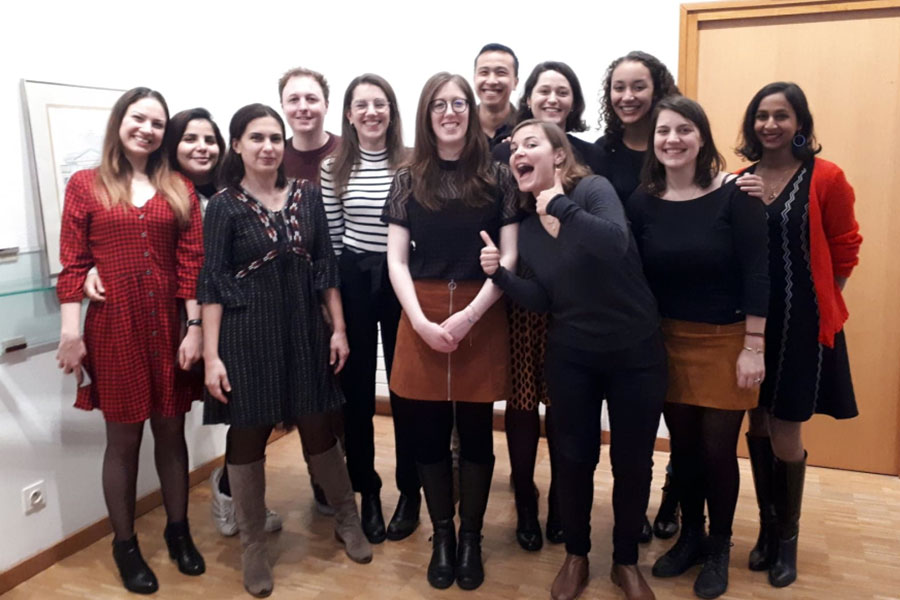AFM Thesis Prize 2020 Laureate : Alice Falchi
Published on May 13, 2020 – Updated on April 13, 2021

The French Association of Marketing (Association Française du Marketing, AFM) has awarded their annual thesis prize to Alice Falchi for her dissertation "Exploring the value of involving customer members in the phases of ideation and selection of a co-innovation process", written under the co-supervision of Sonia Capelli and William Sabadie of iaelyon School of Management.
The thesis prize given by the AFM seeks to highlight the best French language thesis in marketing defended that year, after a careful double-blind selection process. Alice Falchi completed her doctorate with the Marketing Team of the Magellan Research Laboratory and has been supported by the University of Lyon 3 with a doctoral contract, followed by a research assistant position at iaelyon.
The quality of the doctoral work of Alice Falchi, carried out with the help of a SCIC (a cooperative community-orientated business) and a mutualist bank, was singled out by the jury led by experts in the field : Pr. Emmanuelle Le Nagard (ESSEC), Pr. Mathilde Gollety (University of Paris 2 Assas), and Eric Vernette (Toulouse School of Management).
These client-members are both users of the product and owners of the business, they should be therefore more motivated to participate in co-innovation and to provide and select good ideas. In order to evaluate the reasoning behind involving the members and the way in which they are involved, the doctorate explores the case of two businesses that accepted to put a co-innovation campaign in place with their members and with non-member clients: a SCIC (a Société cooperative d’intérêt collectif, or a cooperative community-orientated business) as well as a mutualist bank. By reproducing the same strategy with members and non-members, it is possible to evaluate the role of members and the advantages of involving them according to the objective pursued by the business.
Source : Alice Falchi (2019) "Exploring the value of involving customer members in the phases of ideation and selection of a co-innovation process", Doctoral thesis in management sciences, University of Lyon.
► About the AFM (in French)
The quality of the doctoral work of Alice Falchi, carried out with the help of a SCIC (a cooperative community-orientated business) and a mutualist bank, was singled out by the jury led by experts in the field : Pr. Emmanuelle Le Nagard (ESSEC), Pr. Mathilde Gollety (University of Paris 2 Assas), and Eric Vernette (Toulouse School of Management).
Looking back on Alice Falchi’s thesis
"The members of cooperative institutions, a resource for innovation?"
"Let’s imagine the solar protection of tomorrow”, “What would make you switch to a connected motorcycle”, “What vocal assistant do you use in the kitchen?”…these are just some of the questions that businesses are asking their clients to imagine the offers of tomorrow. This process is what we call co-innovation. The reasoning behind the participation of clients and the quality of the ideas that they are suggesting has long intrigued researchers in marketing. What client do you approach? How do you guide them to give good ideas? In her doctoral work, defend a the University of Lyon, and under the co-supervision of Sonia Capelli and William Sabadie, Alice Falchi shows that cooperative and mutualist institutions are benefiting from a key resource for co-innovation : their client-members.These client-members are both users of the product and owners of the business, they should be therefore more motivated to participate in co-innovation and to provide and select good ideas. In order to evaluate the reasoning behind involving the members and the way in which they are involved, the doctorate explores the case of two businesses that accepted to put a co-innovation campaign in place with their members and with non-member clients: a SCIC (a Société cooperative d’intérêt collectif, or a cooperative community-orientated business) as well as a mutualist bank. By reproducing the same strategy with members and non-members, it is possible to evaluate the role of members and the advantages of involving them according to the objective pursued by the business.
Improve the quality of the business’ offer :
If businesses enter into a co-innovation strategy, it means that they are hoping to be able to source innovation of a better quality. The results of the research show that the members of the cooperative institutions are a key resource for proposing innovative ideas. They are participating more in the co-innovation campaigns and challenges than regular clients are, and they are giving more ideas, which are of higher quality. However, if we consider the selection of proposed ideas in the campaigns, the members and the clients do not separate from each other: they vote for the same ideas.Organizing the cooperative way and converting new members
The managers of cooperative institutions need to keep the democratic function running throughout their structure. The results of the research show that the fact that proposing that clients vote (members, or not) on innovative ideas seems to be more effective than letting the managers of the business make the decision. This action makes participants want to be more involved in the social aspects of the cooperative, of their own volition. In other words, organizing an innovation campaign for which the clients themselves choose the winning ideas enlivens the cooperative spirit and renders the model productive. Ultimately, the members of the cooperative institutions do not seem to want to seize the power for themselves, but are rather attached to listening the ideas of all the fellow clients of the business.Source : Alice Falchi (2019) "Exploring the value of involving customer members in the phases of ideation and selection of a co-innovation process", Doctoral thesis in management sciences, University of Lyon.
► About the AFM (in French)
Lyon 3 Chair Cooperation
Last updated: April 13, 2021
